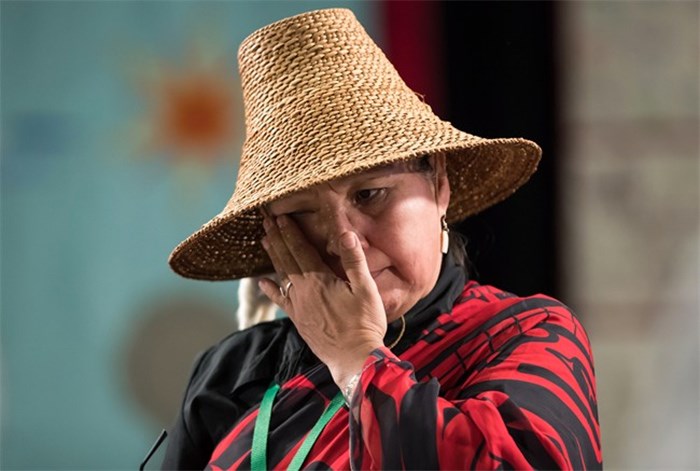 Bernie Williams, who has been an advocate for women in Vancouver’s Downtown Eastside for 30 years, wipes away tears after testifying at the final day of hearings at the National Inquiry into Missing and Murdered Indigenous Women and Girls, in Richmond, B.C., on Sunday April 8, 2018. Williams said her abuse began at age three and continued through foster homes and a marriage, involving broken bones and brutal rapes. One foster family forced the kids to eat from bowls on their hands and knees, like dogs, she said. THE CANADIAN PRESS/Darryl Dyck
Bernie Williams, who has been an advocate for women in Vancouver’s Downtown Eastside for 30 years, wipes away tears after testifying at the final day of hearings at the National Inquiry into Missing and Murdered Indigenous Women and Girls, in Richmond, B.C., on Sunday April 8, 2018. Williams said her abuse began at age three and continued through foster homes and a marriage, involving broken bones and brutal rapes. One foster family forced the kids to eat from bowls on their hands and knees, like dogs, she said. THE CANADIAN PRESS/Darryl Dyck
A longtime advocate for missing and murdered Indigenous women told her own story of abuse on the last scheduled day of public hearings for a national inquiry Sunday.
Bernie Williams, who has fought for women on Vancouver's Downtown Eastside for 30 years, said her abuse began at age three.
"At the age of 11 to 12 years old, six of us girls were sold into the sex trade work," said Williams, who is now 60.
"As many of you know, I don't wear shorts very often, because I have cigarette burns all through my legs right up to my back. ... This is what we endured. We were just kids."
Metro Vancouver's hearings on Sunday were the last that were scheduled for the National Inquiry into Missing and Murdered Indigenous Women and Girls, though others will continue to testify in private.
The inquiry was established by the federal government in 2015 to investigate the disproportionately high number of missing and murdered Indigenous women and girls in Canada, and to give family members a chance to have their stories heard.
Williams, who says she lost three sisters and her mother to murder, told the commissioners she's tired of seeing elders at food banks and unanswered calls for things like health, healing and wellness centres.
"Why has it taken over 4,000 women and girls' names to secure and still keep asking the same questions," she said.
She said it's time to stem a tide of lateral violence — in which people in need fight amongst one another instead of against systemic problems.
Audrey Siegl of the Musqueam First Nation described for the inquiry a close and loving relationship with her grandmother, who raised her, but also said she was punished harshly to prepare her for the toughness of the world.
"I don't cry for me. What happened, happened. But what had to happen to my grammy that, tiny little me, she was able to do that to tiny little me," Siegl said.
Chief Commissioner Marion Buller has said the inquiry needs more time, telling The Canadian Press on Friday that the inquiry has enough material to produce a report but it will only scratch the surface of the issues.
Commissioners asked the federal government last month for a two-year extension.
![]()


